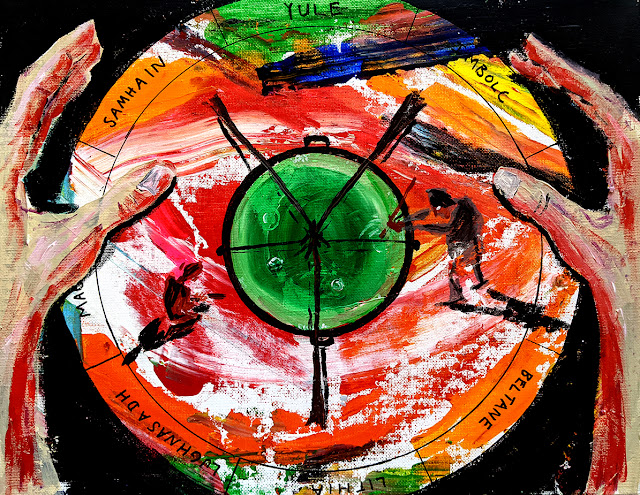Ceridwen is a Welsh goddess, an enchantress, owner of the cauldron of knowledge, Awen. She is the goddess of poetry, wisdom, change, and transformation. She may be a dawn goddess as well, a lady of Venus. Ceridwen is mentioned several times in the 14th century Book of Taliesin. However, her most well known story comes from the Hanes Taliesin, written in the mid 16th century by Elis Gruffydd, a man who was raised Catholic, but converted to Protestantism.
When I first heard the story of Ceridwen, told by a modern day bard on YouTube, I was excited to paint it. A series of paintings, it would be so fun and colorful. Interesting characters, lots of animal chases, creepy unnatural pregnancy, what could be better?
The story begins Ceridwen's children, the twins Creirwy and Morfran. Sadly, they are not identical twins. Creirwy is sublimely beautiful, while Morfran is disturbingly hideous. If Morfran can't be beautiful, Ceridwen decides he must be brilliant. Does she hire tutors? Decide to homeschool him? Read together daily? No. She searches for a magical remedy.
To give her ugly son the gift of knowledge, Ceridwen searches and gathers herbs under every moon, in every season. Then, the potion has to brew in her magic cauldron, the Awen. She offers food and shelter to a servant boy and a blind old man in exchange for stirring the pot and feeding the fire, keeping the potion constantly boiling for one year and one day.

I included the Celtic calendar in the painting of Ceridwen's cauldron. Next, I began painting the fateful moment, the turning point in the story, where all of Ceridwen's effort is wasted, the cauldron is destroyed, and the servant boy steals her power. And, as I painted, I thought. A servant boy steals the power of the great enchantress. She controls transformation, knowledge, wisdom, and this happens. I looked into the sources of this story. The sources are not entitled the "Book of Ceridwen". The sources are entitled the Book of Taliesin and the Hanes Taliesin. Spoiler alert: The servant boy, Gwion Bach, becomes the great bard Taliesin after stealing Ceridwen's wisdom and a few more exciting plot twists. This particular story of Ceridwen and her cauldron is from the 16th century Hanes Taliesin, but I started by looking at the 14th century version Book of Taliesin.
I found this
translation online. The very first stanza is about Adam, of Adam and Eve, the ultimate misogynistic creation myth. I've come to believe that Eve is meant to represent Asherah, the Great Mother Goddess of the Ancient Near East, goddess of wisdom and ex-wife of Yahweh.
I've written a blog post about Asherah and their nasty divorce. The Adam and Eve story is meant to discredit Asherah, the Goddess, whose symbol is the tree of life, and whose epithet is Wisdom.
Similarly, after reading some of the Book of Taliesin and the Hanes Taliesin, I realized this story of Ceridwen is not a story to help us learn about the Great Goddess. Rather, it is Christian propaganda meant to discredit her. And it was so effective, it got me for a minute. I painted this:
I even made Ceridwen unattractive, when her name means fair and beautiful. She is a wise woman. She's not be scorned and defeated by a little boy who later goes on to spout misogynistic monotheism. Stories matter. This is one that doesn't deserve my paint brush, regardless of how many exciting animal chases and unnatural pregnancies I miss out on. I posted this painting on Instagram, the epiphany came to me, and I deleted it. The Great Mother deserves better.
Perhaps I need to write a new version to paint. What should happen after Ceridwen brews the potion for Morfran? Should Creirwy accidentally get half the dose? Should brother and sister unite their wisdom to repel the Christian missionaries and other invaders? Should they use their wisdom to neutralize the poison that the rest of the cauldron now contains or to stop the cauldron from cracking? Help me out in the comments, if you have ideas. Thanks!



Comments
Post a Comment